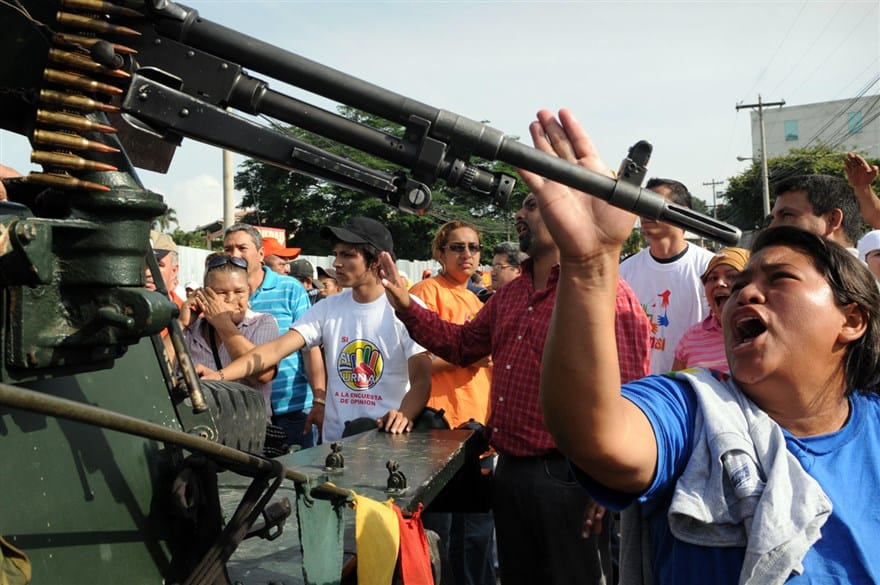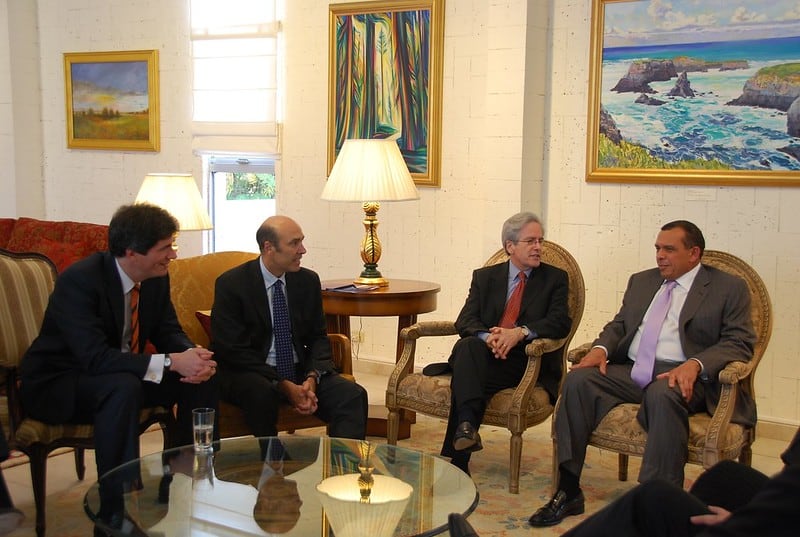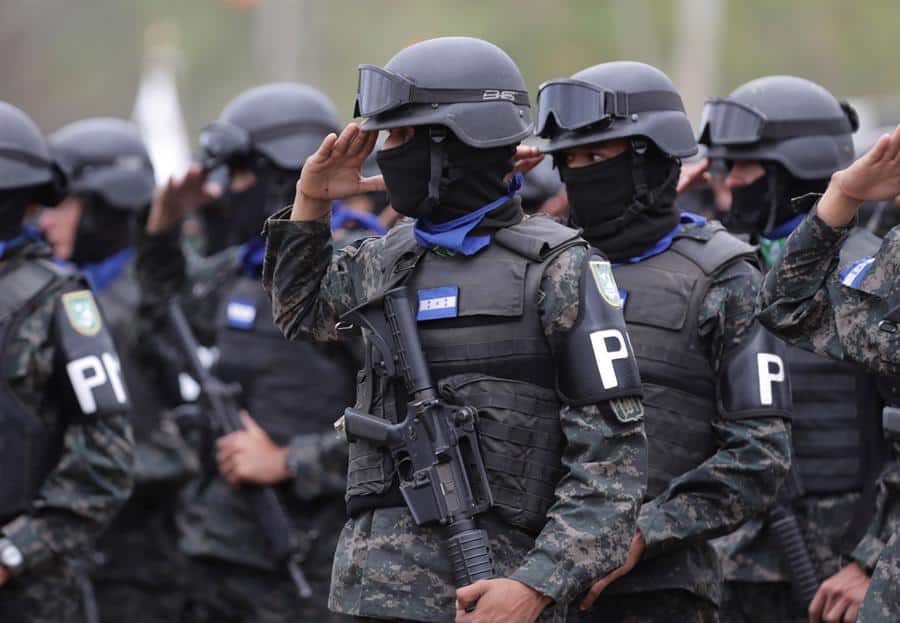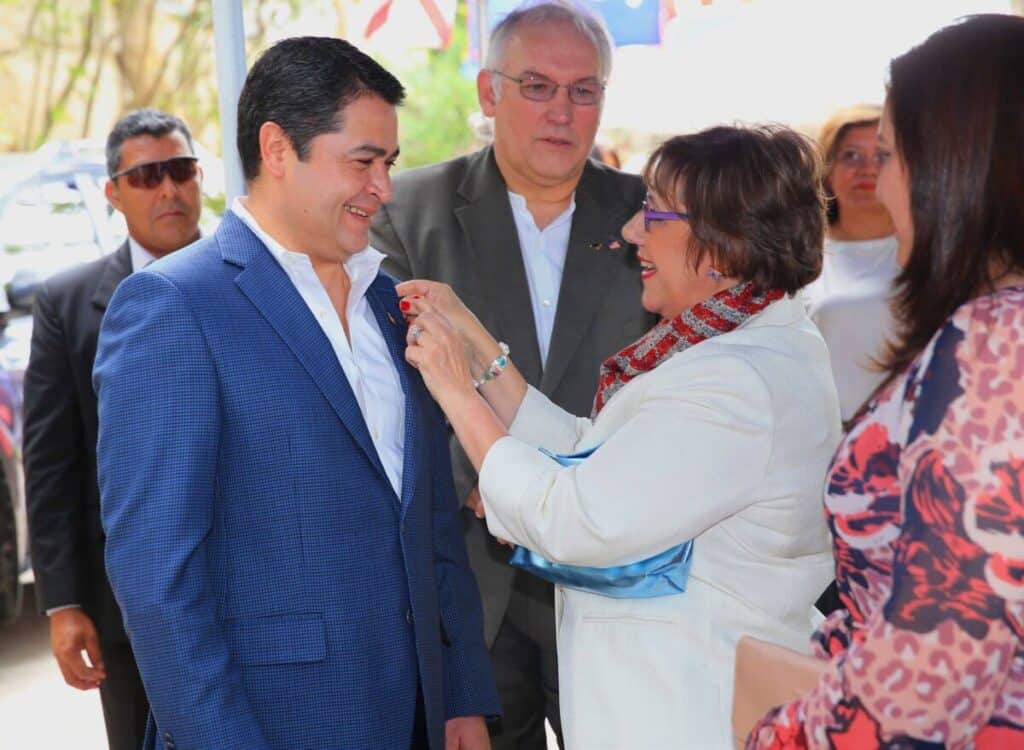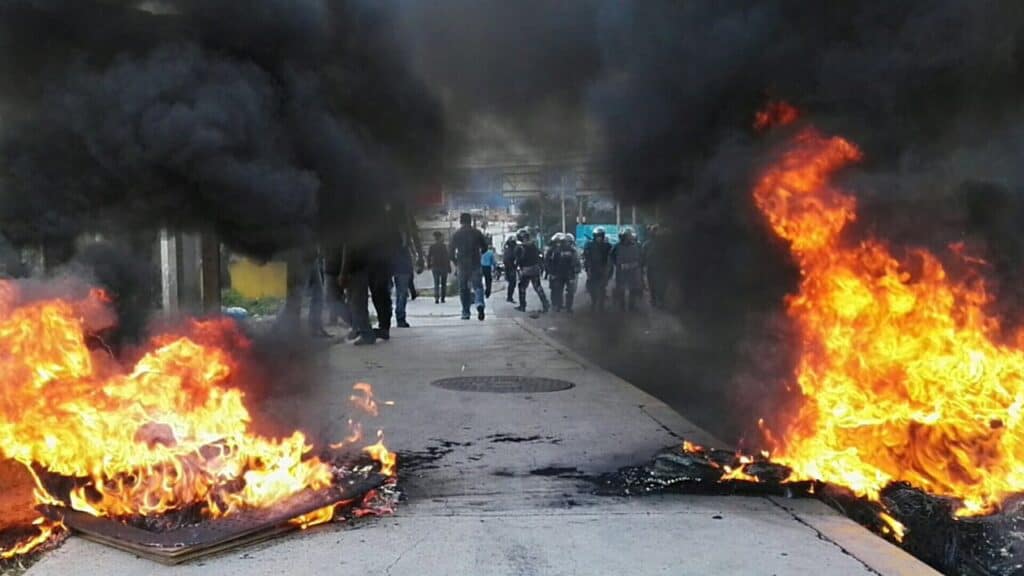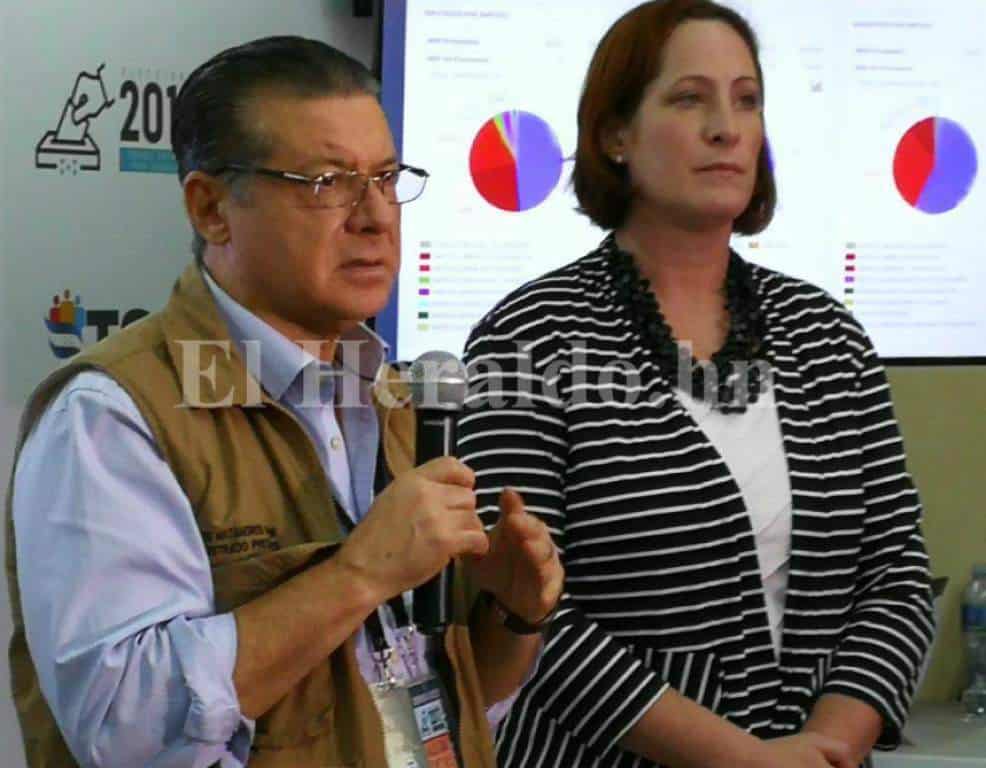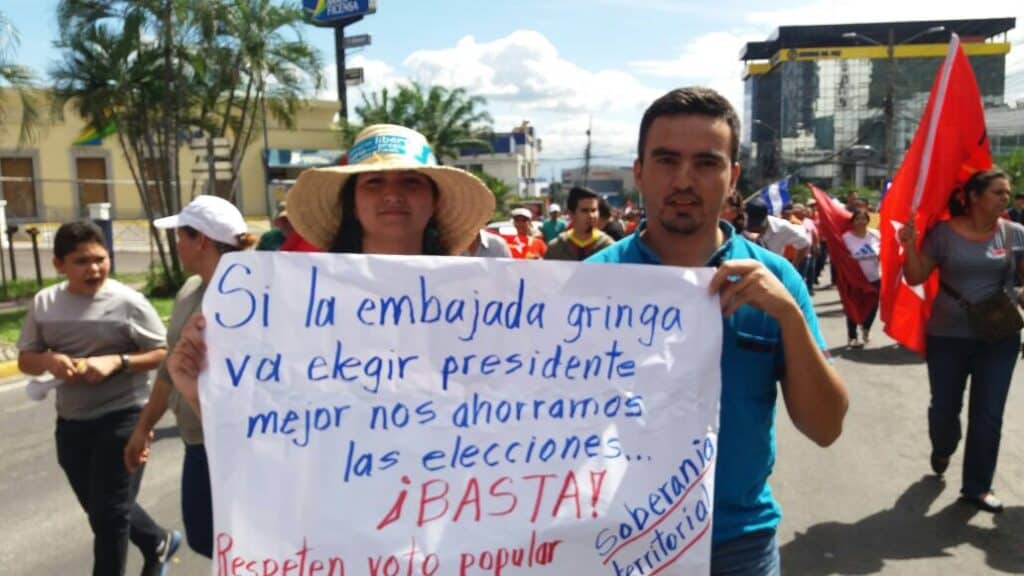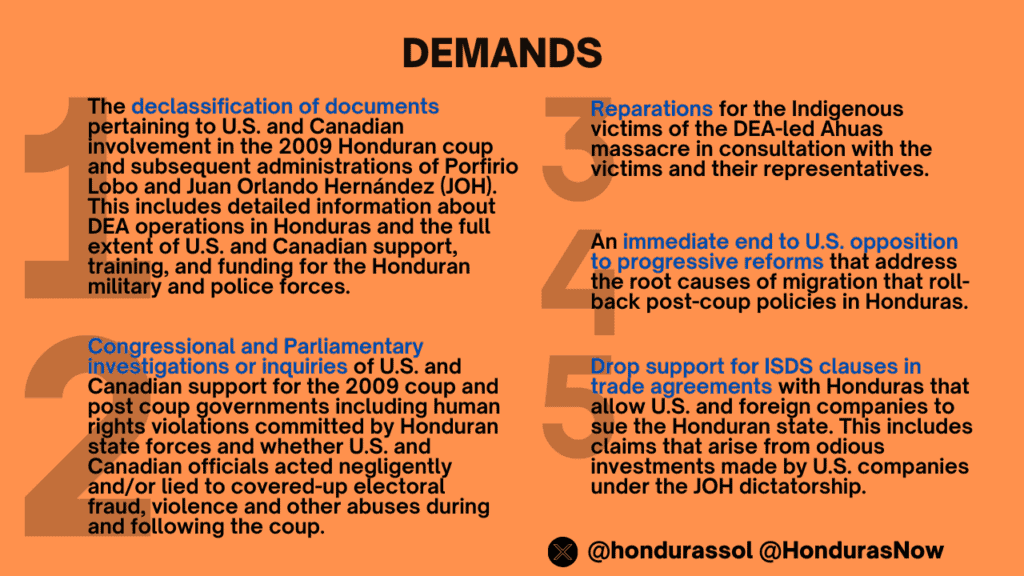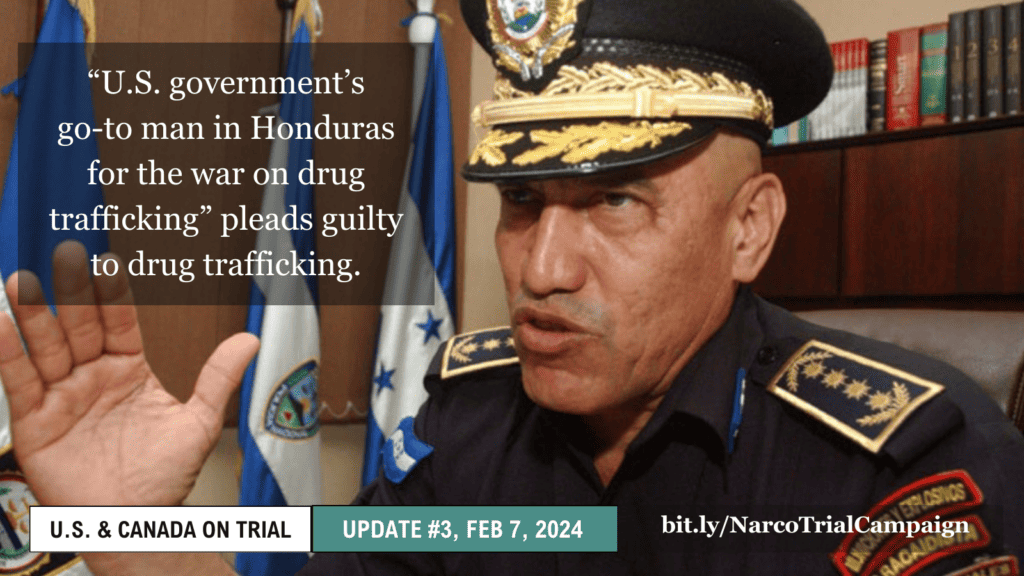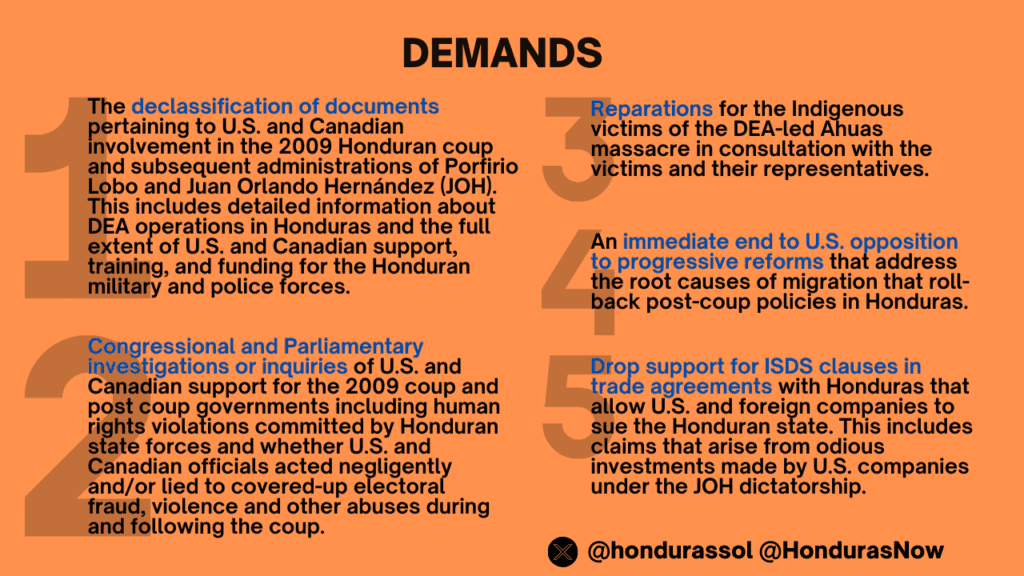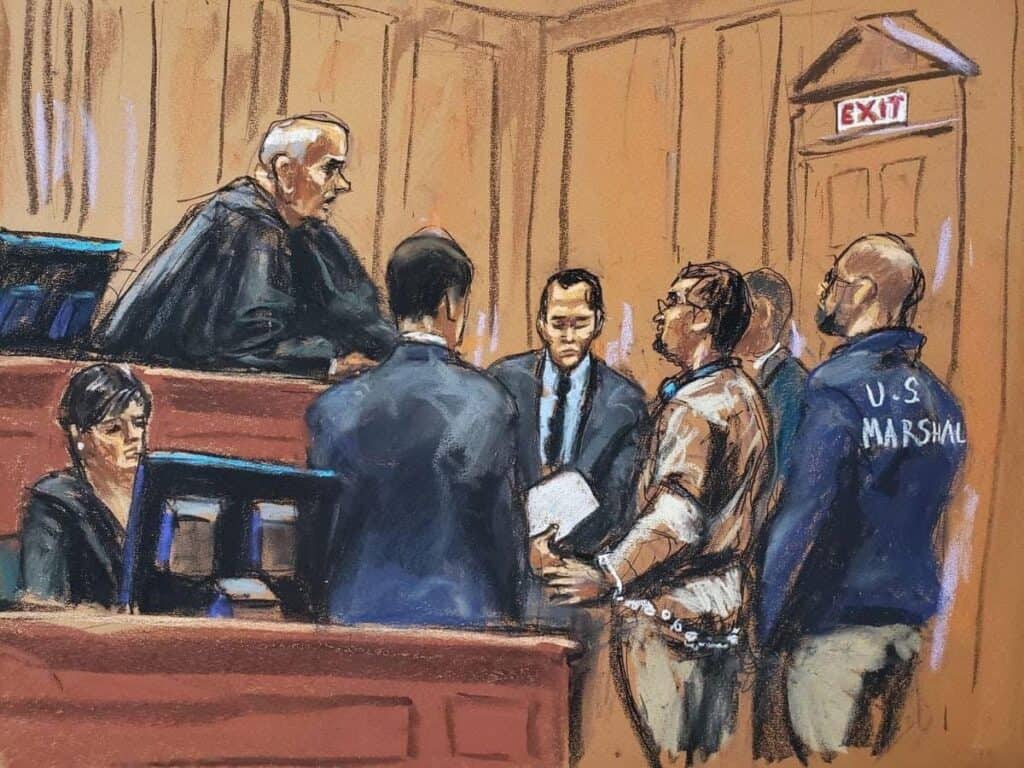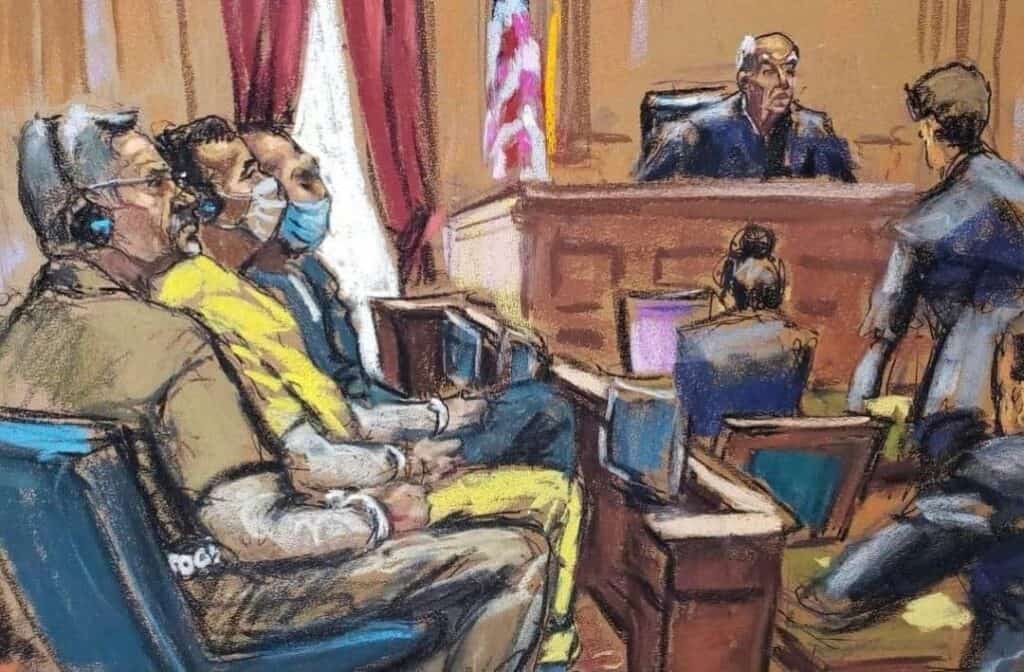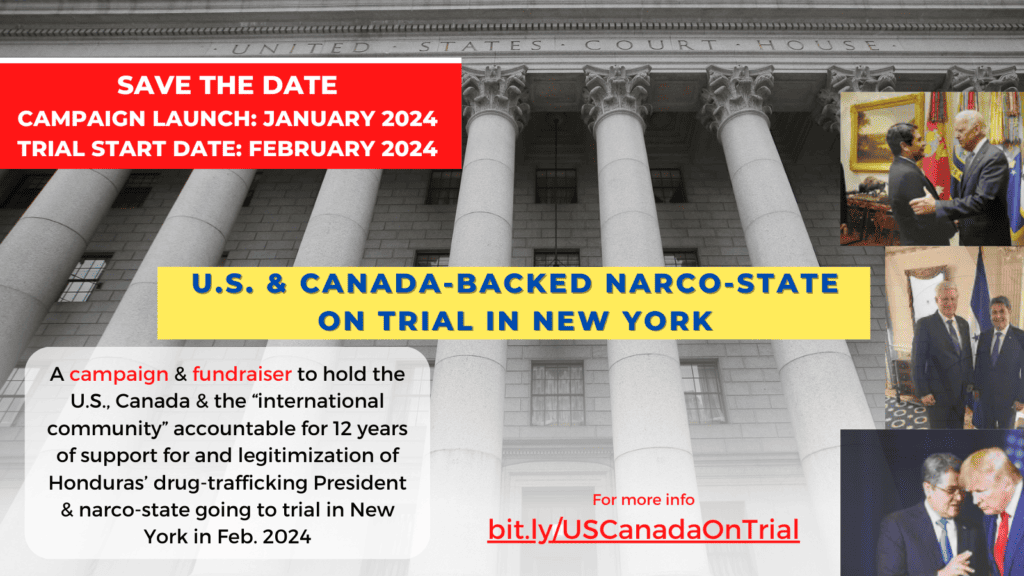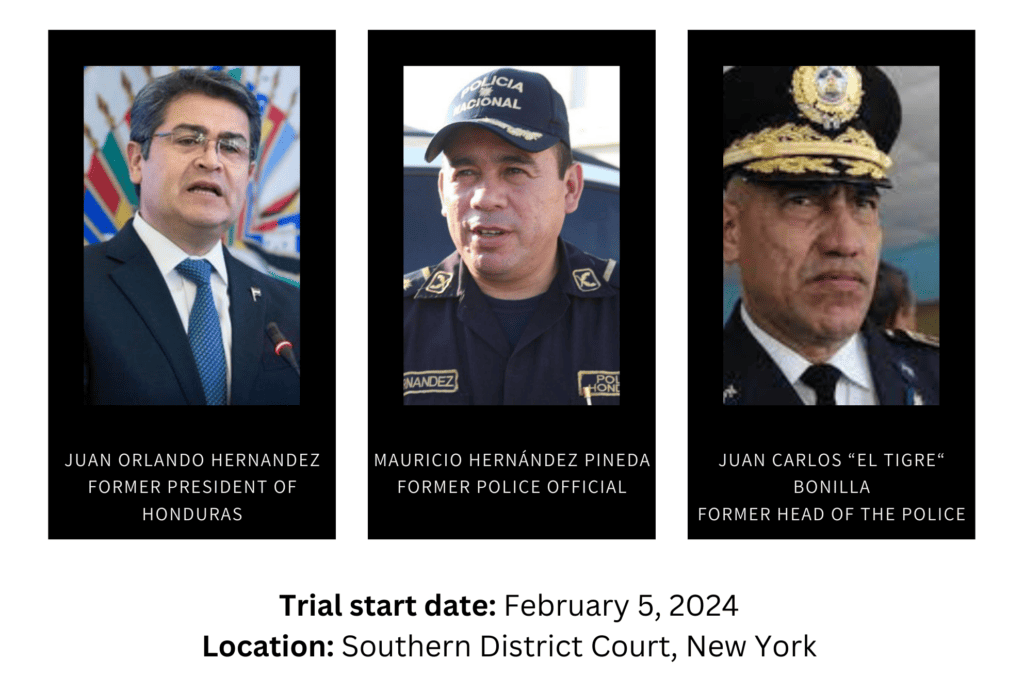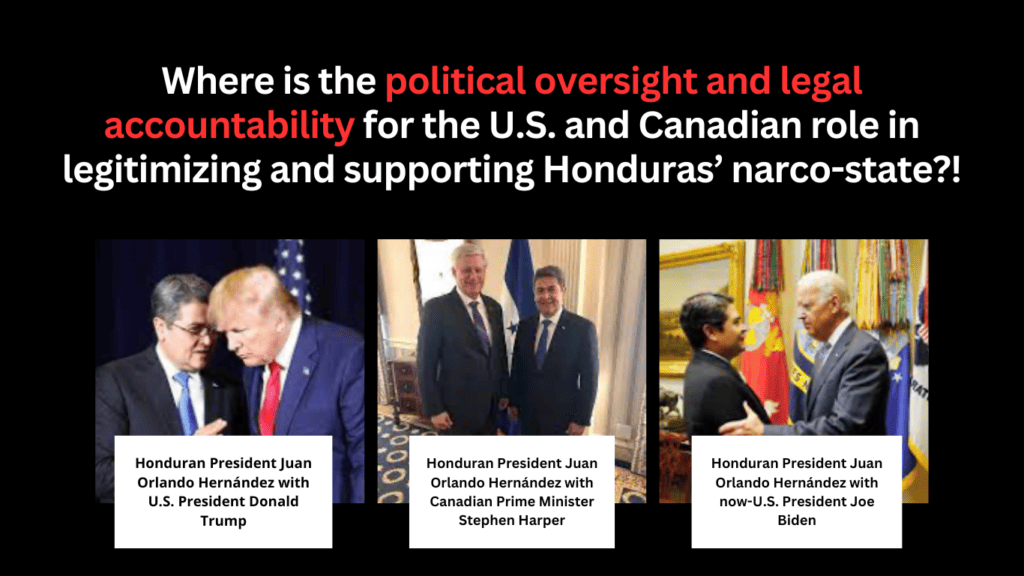Narco-trial Update #11: “There is No Line Between Regular Business and Trafficking,” Says DEA Agent About Honduras

https://www.hondurasnow.org/narco-trial-update-11-there-is-no-line-between-regular-business-and-trafficking-says-dea-agent-about-honduras/
Link to previous summaries of the trial
https://www.hondurasnow.org/category/daily-trial-summaries/
For the ‘Putting the U.S. and Canada on Trial’ campaign updates, go here.
Facebook live recording….

Day Two-opening remarks and two witnesses
- Opening remarks (by both the prosecution and defense) (see a detailed summary of the opening remarks below).
- Two government witnesses testified: A Honduran accountant, José Sánchez (a pseudonym) and cooperating witness Alexander Soriano Ardón, the former mayor of El Paraíso, Copán.
Key Details that Surfaced
- Former Attorney General (AG) Oscar Chinchilla was mentioned. Sánchez mentioned that he gave audio or video evidence of JOH’s meetings with Geovanny Fuentes Ramirez (now a convicted drug trafficker) and Sánchez’s boss, Fuad Jarufe (deceased), to Honduran prosecutor, Marlene Banegas. Sánchez said today that Banegas told him that she gave the evidence to then Honduran Attorney General, Oscar Chinchilla and two months later, Banegas was killed.
- The Honduran military and police were mentioned several times for their involvement in protecting drug shipments and drug traffickers.

Opening Remarks
For the prosecution, David Robles:
“This is a case about power, corruption, massive amounts of cocaine, about a man that stood at the center of all, the former President of Honduras, Juan Orlando Hernandez, the defendant. For years, he worked with the largest, most violent drug traffickers in Honduras and sent tons of cocaine to the United States. Traffickers fueled his rise to power with billions of dollars. In return, he abused his power, the police, military, and justice system to protect that power. Because he did this, he is being charged. That is why we are here.
I am going to talk about: 1) What evidence we will show; 2) How the government will show he is guilty.
Honduras sits at a crucial location of the international cocaine trade. Most of the cocaine produced in the United States is produced in South America, moves through Central America, like in Honduras. Honduras is a country that cocaine is transported through. Cocaine that passes through there, ends up in the U.S. It causes violence and leaves corruption in its wake. It’s a lucrative, dangerous business.
Drug traffickers spent a lot of money bribing people in Honduras to transport drugs – police, military, and people that were willing to abuse their positions for their own gain.
Juan Orlando Hernandez was a Congressional representative that rose to the top of the Honduran government. How? Drug traffickers bank-rolled his political campaigns with millions of dollars. Violent drug traffickers did this, like his brother, Tony Hernández. Drug traffickers murdered their rivals and used heavy weapons. They bought votes, took over polling stations, bribed politicians and worked with the Sinaloa cartel that contributed millions to their campaigns, and worked with the MS-13, a violent gang to conduct their drug trafficking.
This relationship fueled the rise to power of the defendant from 2010 to 2022. The defendant held two powerful positions in Honduras – the President of Congress and President. He abused these positions. He used the military and police to protect shipments of cocaine, protected them from arrest, and extradition to the U.S. to face criminal charges. Protection that allowed drug traffickers to traffic cocaine.
This partnership worked so well because of JOH’s powerful position. And at the same time, he had to maintain a public position of toughness and legitimacy, like passing laws. But behind the scenes, he was protecting drug traffickers and trafficking cocaine.
The evidence will show that. The defendant spent years doing that and used weapons to commit these crimes.
There are two types of evidence in this case, 1) Testimony, 2) Documents – electronic, emails, and calls. You will hear from:
- An accountant that witnessed meetings with JOH and violent drug traffickers and how he promised protection from the police and military. And he bragged that he would “shove the drugs right up the nose of the gringos.”
- Expert witnesses to contextualize the case – DEA agent that will describe cocaine, the price in the U.S. and its profits along the way;
- An expert about machine guns;
- We will also hear from the largest, most violent drug traffickers – JOH’s own associates. They will provide one of the most unique perspectives in the world. Such as:
- A former mayor who shipped massive amounts of cocaine with Tony Hernández and how he helped buy votes.
- Former members of the Sinaloa cartel that contributed millions to JOH’s campaign and how military and police protected trucks filled with cocaine as it moved to the U.S.
- A witness will describe how important it was to have JOH’s support.
These witnesses have committed horrible crimes. They entered into agreements with the government. They have committed violent crimes, but these are the people that JOH decided to work with. Only people he worked with, can tell you how the defendant committed his crimes.
You won’t approve of these people, but the question is whether you believe their testimony.
You will also see:
- Testimony of law enforcement
- Notebooks used by drug traffickers.
- Payments that JOH made to them.
- Contact lists – drug traffickers had JOH’s number because he was available to them.
- Pictures of cocaine, guns, and the defendant himself arm-to-arm with notorious drug traffickers and corrupt officials.
Evidence in the trial will involve corruption, cocaine, and violence. At the heart of the drug conspiracy was JOH, who abused his power for years to traffic drugs.
At the end, we will speak to you again after the evidence is presented.
We ask you to remember three things throughout the trial:
- Pay close attention to the evidence.
- Follow Judge Castel’s instructions.
- Use your common sense.
And you will find that JOH is guilty of the crimes he is accused”. END.
******
For the defense, Renato Stabile:
(Stabile displayed a PowerPoint presentation).
““Hell is empty, and all the devils are here.” That was written by Shakespeare in The Tempest, and I promise you, in this case, all devils will be here in this courtroom.
You will hear from government witnesses that have killed so many people. The number is so high that if you look around the courtroom, the number of people they have killed is more than all that are sitting here. When they get up on the stand, think about that.
Some have killed 78 people; they are facing life. Others 56. Some have tortured and killed children. These are depraved people, psychos, and people not willing of your trust. When the government comes to you to declare this man, Juan Orlando Hernández, guilty, please remember what they are and what these witnesses have done.
My name is Renato Stabile and Mr. Colon and I, represent Juan Orlando Hernandez. In the next few minutes, I will discuss what the evidence in this trial will show and then, what it won’t show.
Who is Juan Orlando Hernandez? He was the President of Honduras, and the President of Congress. He has a Masters degree from Suny, Albany. He has a JD from a university in Honduras. He is married, has four children, and he is one of 17 siblings from a small town in Gracias, Honduras.
In 2013, Honduras was the murder capital of the world. There is no dispute about this. It has a population of approximately 10 million people, like the population of NYC. But it had dozens of murders per day. 80% of the drugs from South America landed in Honduras. Honduras is beautiful. It has the Caribbean on one side. It should be a tourist destination but there was so much violence.
JOH ran for President because he wanted to deal with the violence. As President, drug trafficking was reduced, violence went down, and people were going to jail, and people started to get extradited. Under JOH, the murder rate went down. 80% of drugs passing through Honduras was reduced.
How did JOH do it? He didn’t take bribes. He did not sit down with drug traffickers. Instead, he stood up to them. And they wanted to murder him for that.
What did he do to achieve this? I will go through the evidence about the steps he took and the man that enacted important laws. You will see all the bills he passed, how he froze assets, reformed police forces, created task forces, and worked with the U.S. State Department, Treasury, the Justice Department, the DEA, etc. He worked with them to take down these drug traffickers.
The government says this is all smoke and mirrors and its fake. The evidence is not fake. The legal standard in this case is that they must show beyond a reasonable doubt. Even if it gets up to the line of reasonable doubt – the government must prove beyond a reasonable doubt.
What did he do? He extradited people to the U.S., major drug traffickers from Honduras. The U.S. asked Honduras to extradite 24 drug traffickers and he agreed to every single case. Out of 24 extradited, 21 were arrested. Some fled from Honduras into the arms of the United States and cut deals.
The evidence will show it, and most importantly, pay attention to what it doesn’t show.
There are no recordings of JOH with drug traffickers, no text messages with drug traffickers; no emails; no bank records of money going into his account; and no signs of wealth. You will see witnesses in the courtroom who have cut a deal with the government.
[Put pictures of drug traffickers, amount of cocaine, murders committed on the screen].
You will see Leonel Maradiaga Rivera – 78 murders, 130 kilos of cocaine. Javier Rivera – 48 murders, 130,000 kilos of cocaine, etc. etc.
The government will show you evidence about people talking about JOH. But he was the President, not just some random person. Some texts will refer to JOH, some are hard to understand. It will be like a giant game of telephone. Is it gossip what they are saying? Or real information?
There will be lots of photos of drugs, weapons, photos of JOH with people. You will see lots of pictures of different people. Photos from public events with people.
You will see a brick of cocaine with ‘TH’ on it. The witness will say that ‘TH’ is Tony Hernández. But you should know that drug traffickers will stamp their cocaine with brands with names like Gucci, Prada, etc. etc.
You will see machine guns with JOH’s name and title. This will be presented as evidence in this case. You won’t hear that he uses it or runs on the streets using machine guns.
You’re going to hear a lot about how witness cooperation works. This happens when:
- A proffer: This is an audition. It’s when drug traffickers meet with the government multiple times. If the government likes what they hear, they give them ->
- A cooperation agreement. And then ->
- The witnesses will give their testimony in cases. This is when it’s show time. They will get on the stand and swear on the witness stand. If they provide substantial assistance, they get a 5K letter.
What is a 5K letter? The 5K letter is what they need to: Not die in jail. It’s a way to get out of jail. Most of them have mandatory sentences. Once they get a 5K letter and it’s time for sentencing, the government is going to tell the judge that they have a 5K letter.
And it’s true. They could get any sentence which is up to the judge, not the government. But let’s talk about the cooperation the government has with drug traffickers. They sit down with the government and negotiate a deal with the government. Here is an example:
Some could get witness protection, not just for them, but their families. If they want the government to talk to another prosecutor’s office, the government agrees to do that. For the drug traffickers, it’s all about getting a 5K letter.
Another feature is that in the 5k letter, the drug traffickers have to agree to provide substantial assistance in the government’s case. They have to tell the truth, but the key is substantial assistance to government and the government decides whether they provided that substantial assistance or not. Keep that in mind. If they do that, they get a 5K letter, which is the golden ticket. That is what the drug traffickers are after.
When they are brought in from jail to the court, remember 3 things: How many people they have killed, their time in prison, and their golden ticket: the 5K letter.
Putting drug traffickers on the stand is not achieving proof beyond a reasonable doubt. The drug traffickers have two goals, 1) getting the 5K, 2) Revenge, because JOH signed and put in place laws that put the drug traffickers out of business.
You will also hear lots about about Tony Hernández. It’s all you’re going to hear about. You’re going to hear that Tony threw his brother’s name around and evidence that Tony gave JOH money. Tony Hernández is 10 years younger. Tony is JOH’s kid brother, and they couldn’t be more different. When Tony was 10 years old, JOH was married and out of the house.
I expect that you will hear evidence about how his election was stolen. Does that make sense? What about the details of that? What about the evidence?
You can’t just say the elections were stolen without evidence.
We will be together for a few weeks. After seeing all the evidence, use your common sense. Use your New York City-street common sense. You will know that what was given to you as evidence are angry drug traffickers that are trying not to stay in jail.
For these reasons, you will find that the defendant, is NOT GUILTY.” END
Day Three- confessed drug trafficker, ex-mayor, Alexander Ardon continues on the stand

- Left to right: Renato Stabile, one of JOH’s defense attorney and JOH. February 21, 2024. Court sketch: Reuters.
- Alexander Ardon Soriano or “Chande”, the government’s cooperating witness, confessed drug trafficker, and former mayor of El Paraíso, Copan, Honduras continued on the stand all day.
Key Details That Surfaced
- Ardon described his role in the drug trafficking conspiracy. He transported cocaine for ‘El Chapo’ Guzman and the Sinaloa cartel, and purchased cocaine from Tony Hernández to traffic into Guatemala.
- Trafficking for/with El Chapo Guzman and the Sinaloa cartel: Ardon first met with ‘El Chapo’ Guzman in 2007.
- Ardon was present in a 2010 meeting with ‘El Chapo’, JOH and others in Guatemala City to discuss security for El Chapo’s shipments. Ardon requested Tony Hernández’s help with securing these shipments. After this meeting, the relationship (Tony Hernandez designating security for shipments, selling cocaine to Ardon, and Ardon helping with transportation for Sinaloa cartel) grew.
- In 2013, El Chapo met with Ardon and other drug traffickers in El Espiritu, Copan. In that meeting, El Chapo offered to provide $1 million for JOH’s campaign. Tony said he would discuss it with JOH, and later confirmed to Ardon that JOH wanted the money. El Chapo would later provide hand the $1 million to Tony in another meeting in 2013 held on Ardon’s mother’s property.
- Introduction to drug traffickers and drug trafficking organizations: Ardon provided an important overview of the different drug traffickers and drug trafficking organizations that formed part of the conspiracy in which JOH is accused of being apart. Ardon described several meetings, alliances (getting together to kill enemies, traffic drugs, etc), and discussions between JOH’s brother Tony Hernández, JOH, former President Porfirio Lobo, Mexican drug trafficker ‘El Chapo’ Guzman, the Valle Valle brothers, Wilter Blanco, Mario Calix, Mauricio Hernandez Pineda “primo” , Ronaldo and Otto Salguero, Los Cachiros, his brother Hugo Ardon, ‘Don Armando’ amongst others. His multiple descriptions painted an extensive and complex relationship between Honduran politicians/drug traffickers and cartels that operated across borders and in unison dating as far back as 2005.
- Ardon provided one good example of how JOH was a central person in the conspiracy in Honduras and described some of the dynamics between JOH and his brother, Tony: Even though Tony Hernández frequently met with drug traffickers and coordinated political campaign donations for JOH, Ardon described how he told JOH that the Valle Valle brothers were threatening mayors and had murdered some (one?) in Copan. JOH said he would arrest the Valle Valles. Ardon asked JOH to not inform Tony Hernández out of fear of retaliation from the Valle Valles. Later, the Valle Valles were arrested in 2014 and extradited to the US. Later in a meeting in the Fondo Vial office in Tegucigalpa between Tony, JOH, Hugo Ardon, and Ardon, Tony Hernández told JOH that El Chapo was inquiring about why the Valle Valles had been extradited. JOH said it was because they tried to kill him. Tony then reminded him that El Chapo had provided $1 million for JOH’s campaign. When Tony said this, JOH got angry, responding that he had no obligation to anyone, and left the meeting.
- Ardon described how he explained to Tony Hernández in 2011 a problem he was having with a drug rival named Franklin Arita. Tony told Ardon that he would have Arita killed and would ask ‘El Tigre’ Bonilla, the then Chief of Police of Copan to kill him. Later, Bonilla was promoted to Chief of Police.
- Electoral fraud in 2005, 2009, 2013 and 2017 with bribes, threats, and commitments to drug traffickers: Ardon provided many in-depth details about how drug traffickers and politicians, and in particular Juan Orlando Hernández won and maintained his political power through fraudulent elections, bribes with drug money, and conspiring with drug traffickers. For example:
- In 2005, Ardon bought votes and people working at the voting tables to win his first election as mayor in El Paraiso.
- Pepe Lobo, JOH, and Ardon met in the National Party headquarters in San Pedro Sula about the 2009 elections (prior to the 2009 coup). Ardon asked them for 3 things, 1) Protect him from being investigated, 2) Give his brother, Hugo Ardon a position in Fondo Vial (the state highway infrastructure institution), 3) Pave roads in the municipality in El Paraiso to facilitate drug trafficking and easier access for citizens. In exchange, Pepe Lobo asked Ardon for $2 million to support his and JOH’s campaigns. In addition, JOH asked Ardon to speak to the mayoral candidates and Congressional representatives in Copan to help him win the elections and secure the position as President of Congress. The agreements between them were all met.
- JOH asked Ardon not to run as a mayoral candidate in the 2013 elections because the media was talking about how the Ardon brothers were drug traffickers and that they financed JOH’s campaigns. Ardon agreed. JOH also said that he would put Arnaldo Urbina, a mayor from Yoro in prison if he ran in the 2013 elections as well.
- In 2017, JOH requested $500,000 from Ardon to assist in winning the elections in Gracias, Lempira. In exchange, JOH continued to protect Ardon, who was never arrested or charged in Honduras for drug trafficking.
- Ardon described his agreement as a cooperating witness including how he hopes a judge will give him ‘time served’ but that the government has not made any promises to him nor does testifying mean that he still may face a life sentence for his involvement in drug trafficking.
- Mel Zelaya’s son was briefly mentioned when JOH’s defense attorney, Raymond Colon was questioning Ardon in his cross-examination. Colon asked Ardon in the same line of questioning about the murder of Julian Aristides Gonzalez, the anti-narcotics drug czar in Honduras in December 2009, “were you present in a meeting with Mel Zelaya’s son?” Ardon responded “I do not recall.” Then one of the U.S. prosecutors got up to speak with Colon at the podium, as he had several times throughout the cross-examination to help Colon clarify information. After the 10-second or so private conversation, Colon continued questioning about a different topic.
- Ardon admitted to having conspired in the murders of Julián Aristides González, anti-narcotics czar, and Alfredo Landaverde, a former government advisor. Both were outspoken, key figures in denouncing drug trafficking in Honduras.
Day Four: Former Mayor Ardon Finishes on Stand. Honduran Detective Testifies.
What Happened Today
- Government witness Alexander Ardon, confessed drug trafficking and former mayor of El Paraíso, Copan continued on the stand for most of the day being cross-examined then,
- Government witness Miguel Reynosa (pseudonym), a former Honduran detective of the National Directorate of the Fight Against Drug Trafficking (DCLN) began to testify.
Key Details That Surfaced
- Witness Ardon outlined the investments he made with the drug money he earned in Honduras. He purchased cattle ranches, houses, coffee plantations, vehicles, formed road construction companies, and “spent a lot of money on politics.”
- Juan Orlando Hernández’s (JOH) defense attorney, Raymond Colon stumbled through Ardon’s cross-examination, struggling to form clear, concise, non-repetitive questions before the judge impatiently interrupted him multiple times to set him straight. Colon’s cross-examination was messy but some details that surfaced include:
- Colon tried to elicit more information about a 2009 meeting in La Ceiba where allegedly, the son of President Manuel Zelaya was present. The brief mention of Zelaya’s son on day three caused a stir in Honduras, and attempts to delve into further details leading to any substantive or damning information failed in Colon’s renewed attempt in today’s cross examination.
- Colon tried to get Ardon to admit that he had invited himself over to JOH’s home in Tegucigalpa; and that he was mad at JOH for not allowing him to run in the 2013 election as mayor. Ardon denied these claims.
- Witness Miguel Reynoso, a former Honduran detective described how he and other investigators found the famous ‘narcolibretas’ or drug ledgers inside a seized car confiscated at a checkpoint in Honduras and allegedly belonging to drug trafficker, Magdaleno Meza. The prosecution showed four pages of the ledgers with JOH’s initials on them. On some of the pages, JOH’s name was written next to what seems like quantities of money.

An example of one of the four pages shown in trial from the drug ledgers that were found in Magdaleno Meza’s possession. The ledgers may directly link JOH to other Honduran drug traffickers. This is one of the pages that was revealed during JOH’s brother, Juan Antonio “Tony” Hernández’s trial in 2019.

